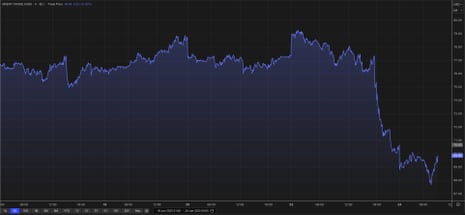Oil rising after Israel claims Iran has violated ceasefire
Oil is now moving higher again, as doubts emerge over the solidity of the Israel-Iran ceasefire announced overnight.
Brent crude is now trading at $69.67 per barrel – that’s still down 2.5% today, but higher than the $67.50 level it fell to earlier this morning.

Oil has risen in the last few minutes, after Israel accused Iran of violating the ceasefire.
Israeli defence minister Israel Katz has said he has ordered the country’s military to respond forcefully.
Key events
Lunchtime market catch-up
Shares have risen in London, and across Europe, this morning as hopes of de-escalation in the Middle East cheer investors.
The UK’s FTSE 100 share index is currently up 35 points, or 0.4%, at 8793 points. Airline stocks have led the rally, with easyJet up 6.4% and IAG (British Airways’s parent company) gaining 5.7%,
European markets are holding most of their earlier gains too, with Germany’s DAX up 1.8% and France’s CAC 1.1% higher.
Markets jumped when trading began, after president Trump announced a ceasefire between Israel and Iran.
That pushed the oil price down to its lowest level in two weeks, with Brent crude down more than 5% at one stage to $67.50 per barrel.
Oil pushed higher, though, after Israel accused Iran of violating the ceasefire, and both sides continued to exchange fire this morning.
Trump has now said both sides have violated a ceasefire, telling reporters he was especially unhappy with Israel.
Brent is currently trading at $69.20 per barrel, still down 3% today, and adding to Monday’s 7% slide.

Lisa O’Carroll
The UK will not meet targets for electric vehicle sales unless the government creates more incentives for consumer to buy including reform of VAT and energy prices, the car industry has warned.
Mike Hawes, chief executive of Society of Motor Manufacturers and Traders, says the automotive industry is paying six times as much tax on energy in British factories as their equivalent in the EU pay.
And despite a years-long campaign to slash prices consumers pay to charge their cars, there is still inequality on the road with those lucky enough to have their own drive paying 5% VAT while those in big urban areas are penalised by paying 20% VAT on electricity from chargers on the public road.
Sam Lister, director general for industrial strategy at the department of business and trade, told the SMMT annual conference this morning that the UK had some of the highest energy prices in the world.
“I think fundamentally, we were at our bottom of the European league table, the global leage table, at £160 per megawatt hour … cabinet definitely backed getting it to £120, so it is significant and gets it to the middle [of the table] in terms of Europe … but [compared with] Texas where it is something like £50 .. there are still some really competitive challenges,” he said.
Hawes also renewed calls for changes in the UK’s Zero Emissions Vehicle (ZEV) rules which sets the percentage of new car and van sales that must be zero emission, saying the current set-up is not working.
Under the government’s ZEV rules 28% of new cars sold this year must by EVs, rising to 80% in 2030 and 100% in 2035.
Hawes said:
“I think if you decide to set a regulation which effectively is seeking to control the market, and the market doesn’t respond, you’ve got to look at the fundamentals behind the market…. which is showing that the underlying level of demand for EVs is below the regulation last year, at 19.6% against 22%. This year we’re running at about 21%, but against [the target of] 28%, so there is a gap.”
Orders at UK factories drop again in June
UK factories have suffered a drop in orders this month.
The CBI’s latest Industrial Trends reports shows that order books were the weakest since January. A net balance of 33% of manufacturers reported that their total order books were reported as below “normal” in June, up from 30% in May.
The report also found that output fell across the sector last month, with the chemicals, metal products and mechanical engineering sectors driving the decline.
The CBI explains:
Manufacturing output volumes fell in the three months to June, at a similarly steep pace to the three months to May. The decline was widespread with output falling in 14 out of 17 sub-sectors.
Looking ahead, firms anticipate that the pace of decline will slow over the three months to September. Total and export order books remained weak in June, with both balances broadly unchanged from last month and below their respective long-run averages.
Manufacturers indicated that stock adequacy for finished goods fell slightly relative to May, with the balance standing below the long-run average. Expectations for selling price inflation eased this month but they remain above the long-run average.
The latest CBI Industrial Trends Survey found that manufacturing output volumes fell in the three months to June, at a similarly steep pace to the three months to May. Looking ahead, firms anticipate that the pace of decline will slow over the next three months pic.twitter.com/xRCYumR8UJ
— CBI Economics (@CBI_Economics) June 24, 2025
Total order books and export order books were reported as below “normal” in June, with both balances broadly unchanged from last month and below their respective long-run averages pic.twitter.com/3r60WZrYKN
— CBI Economics (@CBI_Economics) June 24, 2025
BoE’s Greene: inflation looks more like a “plateau” than a “hump”
One of the more hawkish policymakers at the Bank of England has warned that UK inflation may plateau in the near term, rather than rising over a hump and dropping back again.
Megan Greene has told the National Institute of Economic and Social Research (NIESR) that she is worried about the near-term profile for inflation this year, which she believes “resembles more of a ‘plateau’ than a ‘hump’”.
UK inflation slipped slightly to 3.4% in May, still some way above the Bank’s target of 2%.
Greene fears that current inflation levels will push up the public’s expectations, leading to larger pay rises and higher prices in the shops.
She says:
We expect inflation to resume its fall towards our target from early next year. However, there is a risk that elevated inflation of roughly 3.5% the rest of this year will feed through into inflation expectations, and therefore wage and price setting behaviour.
Aside from energy and regulated prices buoying inflation, food prices have surprised consistently to the upside. Energy and food prices are particularly salient for inflation expectation setting. Household inflation expectations have been rising for months and are at the upper end of the band we might expect given consumer prices.
Business expectations are also elevated but are less out-of-line with the past. I think the risk that our near-term plateau in inflation feeds through into second round effects is skewed to the upside.
Overall, the balance of risks are “skewed to the downside on growth and to the upside on inflation”, Greene argues, adding “This is an uncomfortable place to be for a central banker”.
Greene is one of the seven policymakers on the Bank’s Monetary Policy Committee who voted to leave interest rates on hold last week, with just two policymakers pushing for a rate cut.
Does the drop in the oil price open the door for faster interest rate cuts?
Professor Costas Milas, of the management school at the University of Liverpool, explains that falling geopolitical risks could pave the way to earlier interest rate cuts:
There are currently two big shocks in operation: one negative shock related to Trump’s notorious tariffs (with a deadline looming shortly for countries to “agree” trade deals with Trump), and a big benign geopolitical shock related to the Israel-Iran (and now U.S.) peace “agreement”. The expectation is that these shocks will move in opposite direction, the first one pushing up inflation and depressing U.S. growth. The second one will suppress inflation and lift US growth.
To the extent that the positive effects from the obvious collapse in geopolitical risk outweigh the negative effect from tariffs, the door opens for Jerome Powell and U.S. policymakers to cut the Federal Funds rate as soon as next month! This will also persuade the BoE to cut rates in early August.
Middle East stock markets rise
Middle East stock markets are notably higher today, despite concerns that the Israel-Iran ceasefire remains fragile.
In the UAE, the Dubai Financial Market (DFM) index has jumped by 3% so far today, led by Air Arabia (+9%) and the National Cement Company (+8.8%).
Saudi Arabia’s Tadawul index is 1.7% higher, while Bahrain’s all share index and Qatar’s main stock index are both up 1.5%.
Israel’s TA-125 index has gained 1.4%.
XTB: fragile ceasefire keeps markets on edge
Oil could swiftly push higher if the “fragile” Israel-Iran ceasefire falters, warns Kathleen Brooks, research director at XTB:
The oil price dropped sharply on Tuesday after President Trump announced a ceasefire between Iran and Israel. However, while the agreement initially looked solid, this is still a very fluid situation.
The rapid oil price decline earlier today, was a sign that the market is taking this agreement as a done deal. Brent crude had rallied nearly 20% in the past month as a war premium was attached to the price of oil, which is now being unwound. However, if there are more signs that the ceasefire is not holding, we could see the oil price resume its uptrend.
Reminder, you can track developments here:
Oil rising after Israel claims Iran has violated ceasefire
Oil is now moving higher again, as doubts emerge over the solidity of the Israel-Iran ceasefire announced overnight.
Brent crude is now trading at $69.67 per barrel – that’s still down 2.5% today, but higher than the $67.50 level it fell to earlier this morning.
Oil has risen in the last few minutes, after Israel accused Iran of violating the ceasefire.
Israeli defence minister Israel Katz has said he has ordered the country’s military to respond forcefully.
US-UK trade deal to come into force on Monday

Lisa O’Carroll
The US-UK trade deal bringing tariffs down to 10% on auto sector and zero on steel will come into force next Monday, after the Trump administration put the agreement on the official register on Monday night, my colleague Lisa O’Carroll reports.
Amazon announces major UK expansion

Sarah Butler
Amazon has confirmed plans to build four new distribution centres, two new head office buildings and “upgrade and expand” its existing network of over 100 buildings across the country creating thousands more jobs in the next three years.
The company claimed that the developments, some of which had already been announced, plus its investment in workers’ salaries and other operational payments would add £38bn to the UK economy over the period.
Amazon already employs over 75,000 people in the UK and the investment includes a number of previously announced plans including distribution centres in Hull and Northampton – which are set to open this year and next which it said would employ 2,000 people each. Thousands more will be employed to help run two additional warehouses planned for the East Midlands in 2027 or 2028.
The investment also includes the building of new data centres, which had already been announced, and the redevelopment of the historic Bray Film Studios in Berkshire, and TV and film productions for its Prime service.
Prime Minister Keir Starmer, who met Amazon’s chief executive Andy Jassy last week, said the investment was “a massive vote of confidence in the UK as the best place to do business” and meant “thousands of new jobs—real opportunities for people in every corner of the country to build careers, learn new skills, and support their families.”
However, the investments come amid fears that major high street retailers are losing out to online specialists such as Amazon partly because of the business rates regime which is based on property. The government promised to adjust the rates regime so that the likes of Amazon paid more. However its current plans for reform mean any business trading from the largest high street stores will increase their payments from next year.
A digital services tax, introduced to try and level the playing field between high street and online retail, is seen as insignificant with its future potentially in doubt amid negotiations with the US over import tariffs.
In 2023, Amazon’s main UK division paid corporation tax for the first time since 2020 after the end of a “super-deduction” tax break introduced by Rishi Sunak.
UK grocery inflation hits highest level since early 2024
The tumble in the oil price will ease concerns that consumers will be hit by higher fuel and transport costs.
But the latest news on inflation is less welcome.
Annual British grocery price inflation rose to 4.7% for the four weeks to June 15, its highest level since early last year, data from market researcher Kantar shows.
That’s an increase from 4.1% a month ago, showing that the squeeze on households is tightening.
Airlines are continuing to halt some flights to the Middle East, due to safety concerns, despite this morning’s ceasefire news.
British Airways says it has suspended all flights to Doha up to and including June 25, Reuters reports.
And budget carrier Wizz Air is cancelling flights to and from the United Arab Emirates until June 30.
Equity markets are soaring off the back of the Israel-Iran ceasefire news, reports Chris Beauchamp, chief market analyst at IG:
“Markets have cheered the news of a ceasefire in the Middle East, rallying hard as the prospect of a conflict between the US and Iran recedes into the background. The Israeli attack on Iran came as a surprise, as did the US strike at the weekend, but the pause in the fighting removes a key worry for investors and puts a sustained rally in equities back on the table.”
“There are still hurdles to navigate, most notably the 8 July deadline for trade deals, but for the moment the market thinks that there will be some kind of fresh extension. Slumping oil prices have negated some inflation fears for now, and with two Fed governors calling for rate cuts the overall tone continues to be supportive for risk assets.”
European stock markets
The rally is sweeping across European stock markets this morning, as volatility drops
Germany’s DAX index is 1.8% higher in early trading, while France’s CAC is 1.44% higher and Spain’s IBEX has gained 1.45%.
The EURO STOXX volatility index, a gauge of fear in the markets, has tumbled by 3.1 points to 19.31, the lowest since 12 June.


